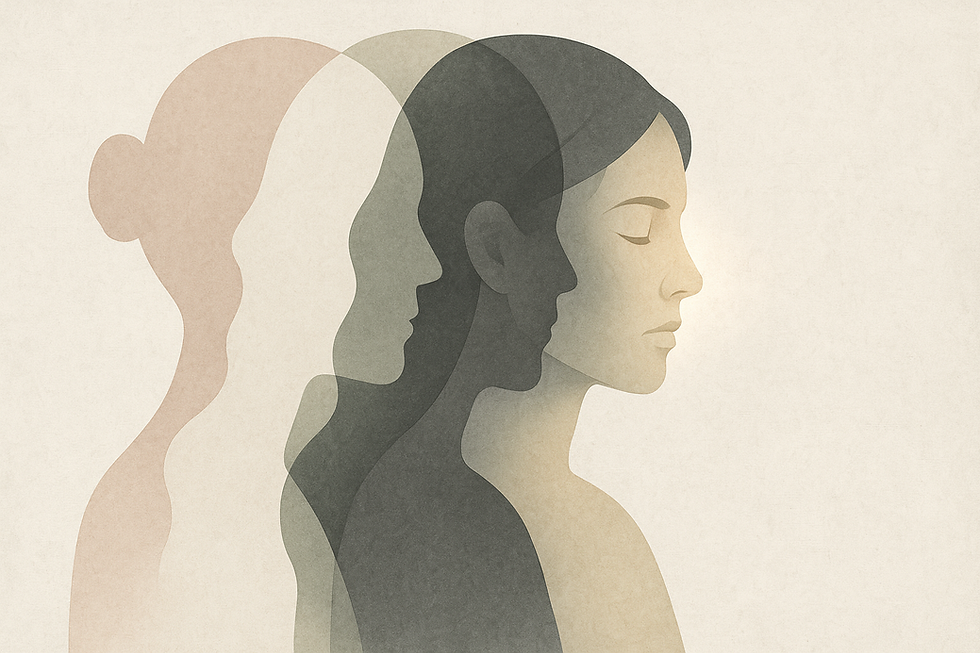The Many Faces of Abuse
- Trina Kay

- Nov 9, 2025
- 3 min read

Abuse doesn’t always leave bruises.Sometimes it hides behind apologies, inside jokes, or “that’s just how they are.” It can be quiet, subtle, and hard to name — especially when the world tells you to look for black eyes instead of broken confidence.
The truth is, abuse wears many faces.It’s not just physical. It’s emotional, spiritual, sexual, financial, and psychological. It’s control disguised as care, cruelty dressed up as love.
Today, I want to talk about the forms of abuse that often go unseen — the kinds that survivors spend years untangling, long after they’ve left.
Emotional Abuse
Emotional abuse is the slow erosion of self-worth. It sounds like:“You’re too sensitive.”“No one else would put up with you.”“I was just joking — can’t you take a joke?”
It’s the constant walking on eggshells, the rewriting of your reality until you start doubting your own memory. It’s being ignored as punishment, or loved only when you behave.
Over time, emotional abuse convinces you that you are the problem. That if you could just try harder, be quieter, be smaller — maybe you’d be loved again.
Spiritual Abuse
Spiritual abuse twists faith into fear. It happens when someone uses religion, scripture, or moral authority to control, shame, or silence you.
It might sound like:“God hates divorce.”“You have to forgive me — the Bible says so.”“If you were really faithful, you’d submit.”
Faith should bring comfort and connection, not control. When someone uses your beliefs as a weapon, they are not acting in faith — they are acting in power. Healing from this kind of abuse often means rebuilding not just your self-trust, but your connection to whatever you believe in — on your own terms.
Sexual Abuse
Sexual abuse isn’t always violent. Sometimes it’s subtle coercion: pressure, guilt, manipulation.“Come on, you owe me.”“You led me on.”“If you really loved me, you would.”
Consent isn’t the absence of a “no.”It’s the presence of a free and willing “yes.”
For survivors, sexual abuse can create layers of shame and confusion. It can distort how you see your own body and your right to pleasure or safety. Healing means reclaiming autonomy — learning that your body belongs to you again.
Financial Abuse
Money is power — and abusers know it. Financial abuse happens when one person controls another’s access to money, resources, or independence.
It looks like:
Taking your paycheck “for the bills” and never explaining where it goes
Destroying your credit so you can’t leave
Quitting your job for you, or insisting you don’t “need” to work
Giving you an “allowance” that keeps you dependent
Financial control traps survivors long after the relationship ends. It’s one of the most common reasons people stay — because leaving without money feels impossible. Real freedom begins when you can make decisions without fear of punishment or poverty.
Coercive Control
Coercive control is the invisible cage. It’s not one act — it’s a pattern. A slow tightening of rules, routines, and reactions until you stop fighting back.
It can look like:
Monitoring your phone or social media
Isolating you from friends and family
Dictating what you wear, eat, or say
Threatening self-harm if you leave
“Accidentally” breaking things you love
It’s about dominance, not disagreement. And it can exist without ever raising a hand.
Coercive control is now recognized by law in some countries as a form of domestic abuse — because it is. It destroys freedom from the inside out.
Why Naming It Matters
When we name the many faces of abuse, we reclaim power. We stop minimizing what happened. We stop saying, “At least it wasn’t physical.”
Abuse is abuse.If someone systematically breaks your spirit, isolates you, controls you, or takes away your choices — it counts.
Naming it gives survivors language for what they endured, and language is the first step toward freedom. You can’t heal from something you’ve been taught not to name.
If you see yourself in any of these words, please know this: it’s not your fault. You are not dramatic, crazy, or overreacting. You are a person who deserves safety, respect, and peace.
You are not alone. Support is available through the National Domestic Violence Hotline at 1-800-799-SAFE (7233) or by texting START to 88788.If you’d like to share your story with Survivor Voices, you can do so by emailing me @TrinaKayLLC@gmail.com.





Comments